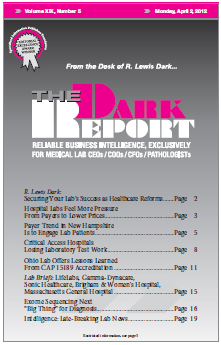CEO SUMMARY: A health insurer’s two-year-old effort to have patients choose low-cost laboratory testing options is causing patients to shift their lab work away from New Hampshire’s hospitals and instead use Quest Diagnostics, LabCorp, and ConVerge (a commercial lab company). This new health insurance program offers a number of important lessons for pathologists and lab …
Payer Trend in New Hampshire Is to Engage Lab Patients Read More »
To access this post, you must purchase The Dark Report.


